【湖南师大内部资料】高二英语课件:(牛津译林版)m5-u1 reading2
文档属性
| 名称 | 【湖南师大内部资料】高二英语课件:(牛津译林版)m5-u1 reading2 |  | |
| 格式 | rar | ||
| 文件大小 | 217.1KB | ||
| 资源类型 | 教案 | ||
| 版本资源 | 牛津译林版 | ||
| 科目 | 英语 | ||
| 更新时间 | 2011-04-03 11:50:00 | ||
图片预览

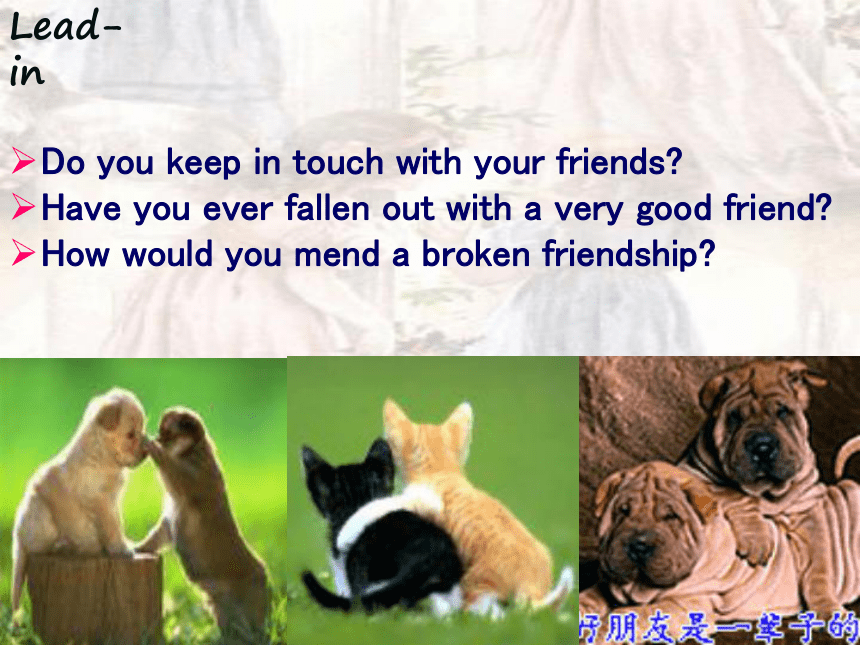
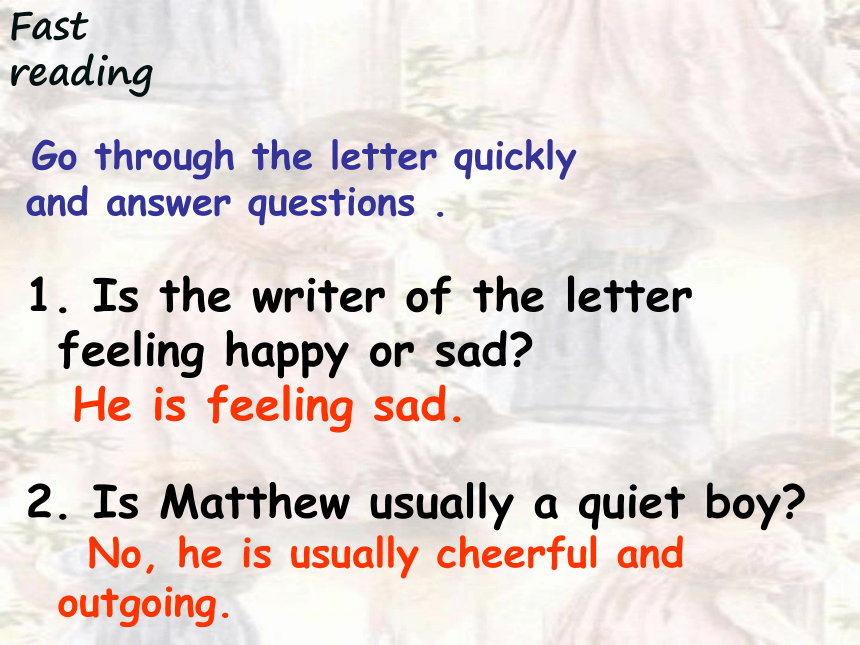
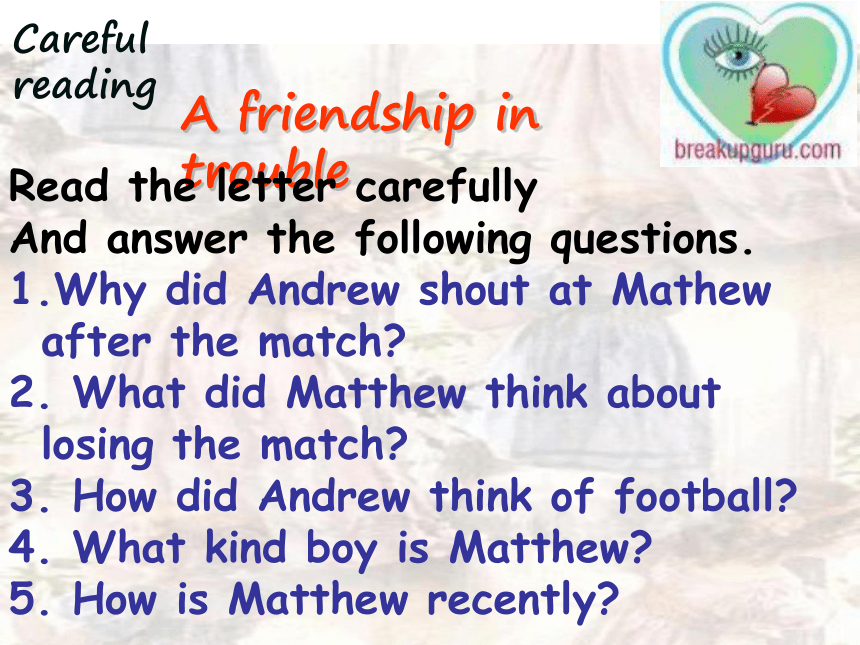
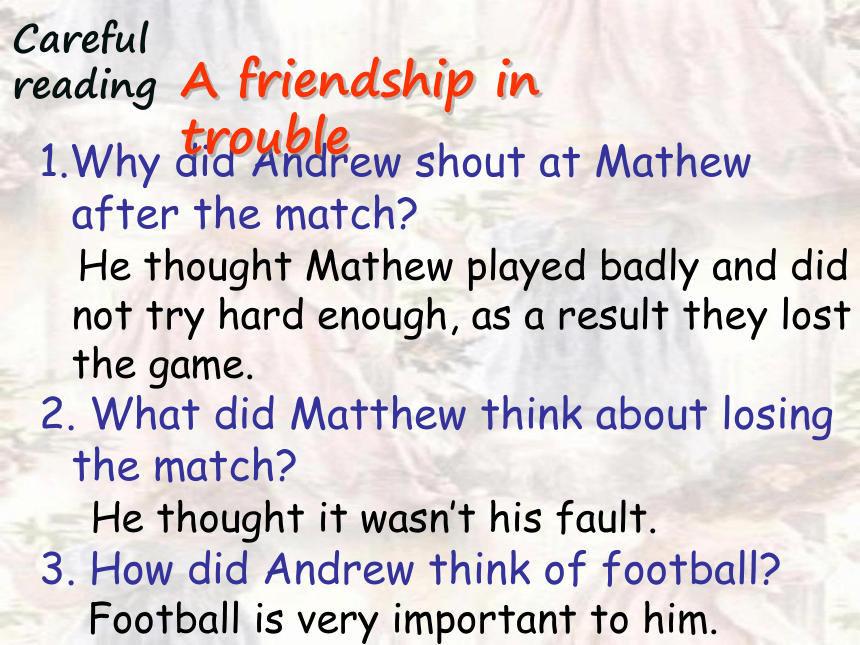
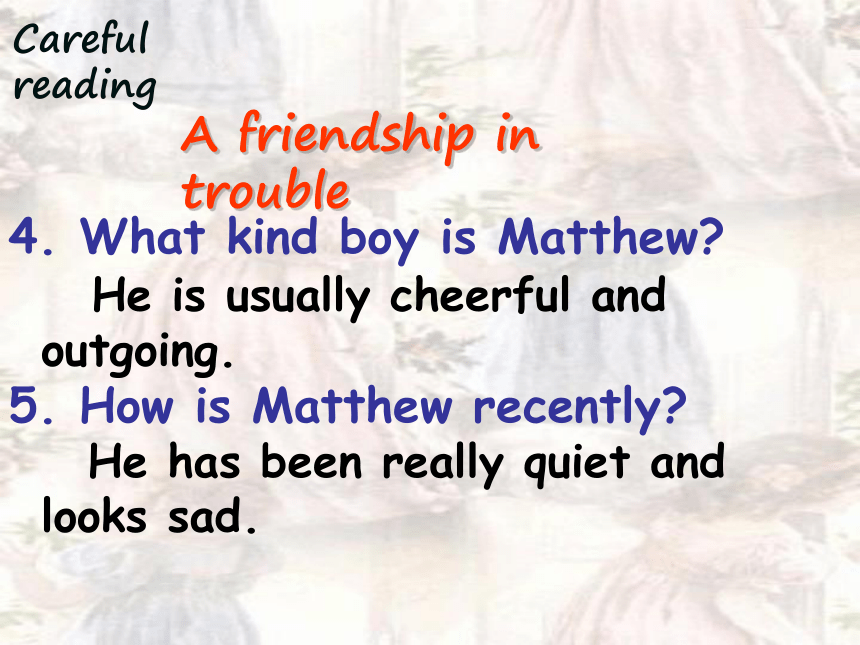
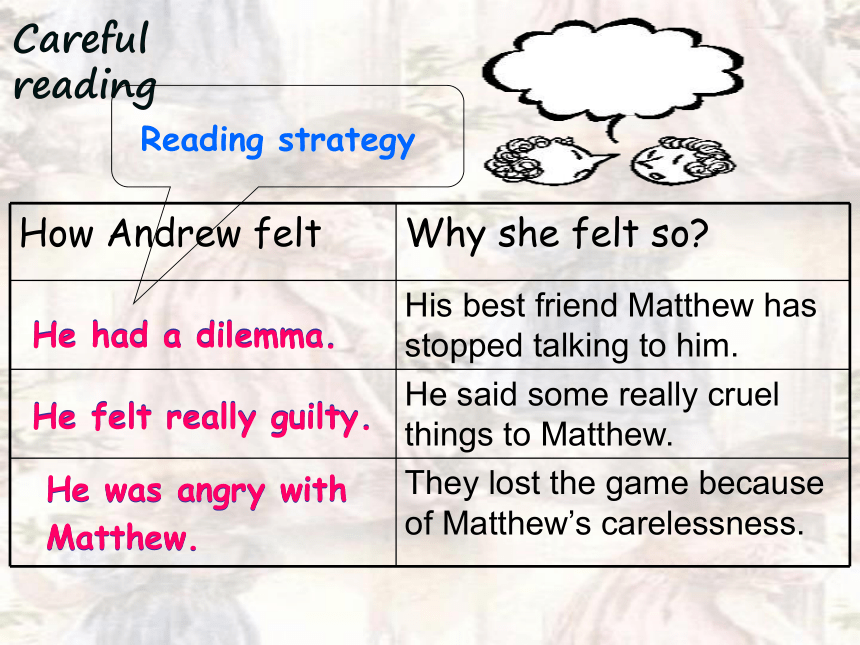
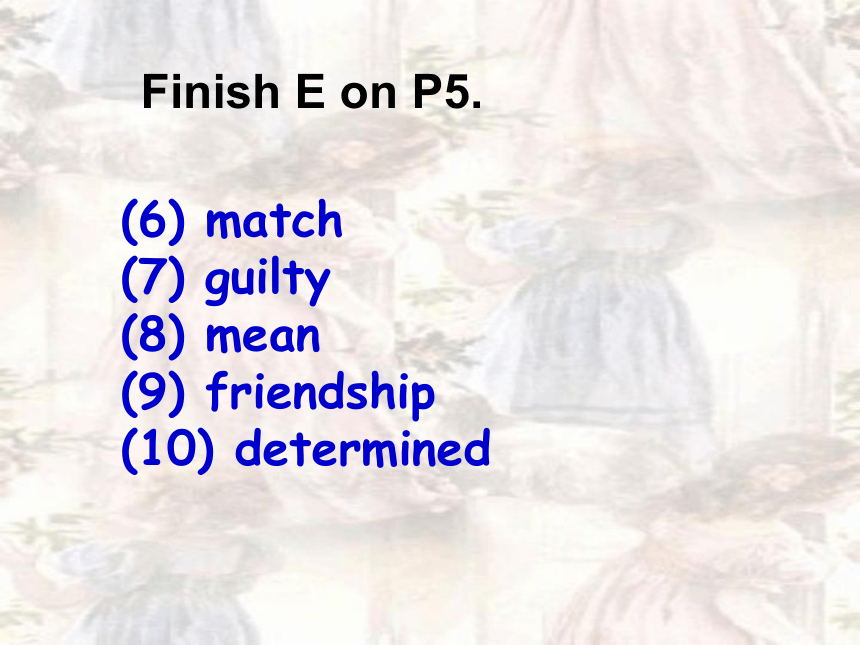
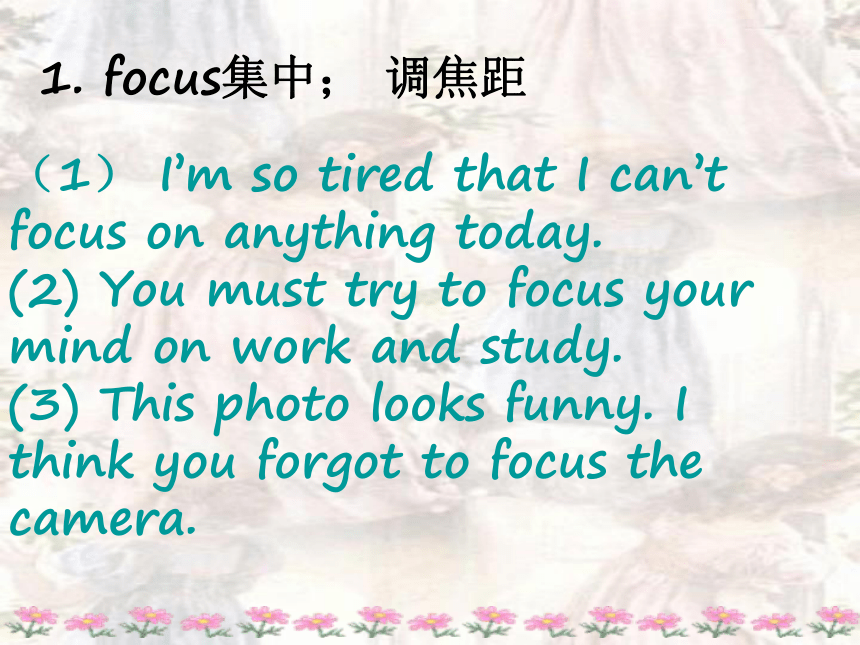
文档简介
课件24张PPT。Getting along with othersReading OneLead-inDo you keep in touch with your friends?
Have you ever fallen out with a very good friend?
How would you mend a broken friendship? Go through the letter quickly
and answer questions .
1. Is the writer of the letter feeling happy or sad?
He is feeling sad.
2. Is Matthew usually a quiet boy?
No, he is usually cheerful and outgoing.Fast readingCareful readingA friendship in trouble Read the letter carefully
And answer the following questions.
1.Why did Andrew shout at Mathew after the match?
2. What did Matthew think about losing the match?
3. How did Andrew think of football?
4. What kind boy is Matthew?
5. How is Matthew recently?
1.Why did Andrew shout at Mathew after the match?
He thought Mathew played badly and did not try hard enough, as a result they lost the game.
2. What did Matthew think about losing the match?
He thought it wasn’t his fault.
3. How did Andrew think of football?
Football is very important to him.A friendship in trouble Careful reading4. What kind boy is Matthew?
He is usually cheerful and outgoing.
5. How is Matthew recently?
He has been really quiet and looks sad.A friendship in trouble Careful readingCareful readingHe had a dilemma.He felt really guilty.He was angry with
Matthew.He had a dilemma.He felt really guilty.He was angry with
Matthew.Reading strategy
(6) match
(7) guilty
(8) mean
(9) friendship
(10) determinedFinish E on P5.1. focus集中; 调焦距
(1) I’m so tired that I can’t focus on anything today.
(2) You must try to focus your mind on work and study.
(3) This photo looks funny. I think you forgot to focus the camera.
2. He kept on saying really mean things to hurt me. (Line 44)
Watch him. He can be really mean.
He is always mean with money.
This word means a kind of meat in English.
I didn’t mean to hurt you.
Missing the bus means waiting for another hour.
Every means has been tried.( n.方式,方法)
3 . I feel really guilty because I said some really cruel things too, but I can’t stand seeing our team lose. (Line 46) 忍受 (bear, put up with)
All the audience stood and clapped.
In front of the house stands a tall tree. (位于)
There is a fruit stand in the street. (n. )水果摊
She couldn’t stand being kept waiting.
I can’t stand your talking to me like that.
4… but he has not apologized to me. (道歉)
apologize to sb. for sth.
apology (n.)
make an apology to sb. for sth.
他因为迟到而向老师道歉。
(2)他为自己的粗心而写信致歉。He apologized to his teacher for his being late.He wrote to make an apology for his carelessness.5.Since the match, he hasn’t spoken to me even though we sit next to each other in class.They decided to leave each other even though they loved each other.6. … I cannot help wondering if she wants Peter to be his best friend instead of me.(Line 53)
cannot take control of oneself and do…
eg.
When thinking of the jokes, I can’t help laughing.7. I told my brother about the fight, but he said Matthew is just angry and perhaps a little bitter because I am really athletic and good at football and that I had better find another friend.(1) 苦的,有苦味的
He swallowed the bitter pill.
Good medicine tastes bitter.(2)辛酸的;痛苦的; 剧烈的
Failure is bitter.
The whole thing turned into a bitter quarrel.(3). 严寒的;刺骨的
He wore a thick overcoat as a protection against the bitter cold.8. blame
blame sth on sb./ sth.( 把某事归咎于某人)
blame sb. for sth.(为某事责备某人)
be to blame ( for sth.) ( 该为…受责备;应为…承担责任)(1)他把自己的失败归咎于他的老师。
(2)警察把那起交通事故归咎于杰克的粗心驾驶。
(3)这场火灾该由谁负责?He blamed his teacher for his failure.The police blamed the traffic accident on Jack’s careless driving.Who is to blame for the fire?9. doubt n. V
There is no doubt that…
There is no doubt about…There is no doubt that you will succeed.
There is no doubt about his success.
I doubt whether he has told the truth.doubt后接名词性从句
(1) 肯定句多用 whether, if
(2) 疑问句,否定句时多用 thatHomeworkRetell the two letters.
Do B2.
Have you ever fallen out with a very good friend?
How would you mend a broken friendship? Go through the letter quickly
and answer questions .
1. Is the writer of the letter feeling happy or sad?
He is feeling sad.
2. Is Matthew usually a quiet boy?
No, he is usually cheerful and outgoing.Fast readingCareful readingA friendship in trouble Read the letter carefully
And answer the following questions.
1.Why did Andrew shout at Mathew after the match?
2. What did Matthew think about losing the match?
3. How did Andrew think of football?
4. What kind boy is Matthew?
5. How is Matthew recently?
1.Why did Andrew shout at Mathew after the match?
He thought Mathew played badly and did not try hard enough, as a result they lost the game.
2. What did Matthew think about losing the match?
He thought it wasn’t his fault.
3. How did Andrew think of football?
Football is very important to him.A friendship in trouble Careful reading4. What kind boy is Matthew?
He is usually cheerful and outgoing.
5. How is Matthew recently?
He has been really quiet and looks sad.A friendship in trouble Careful readingCareful readingHe had a dilemma.He felt really guilty.He was angry with
Matthew.He had a dilemma.He felt really guilty.He was angry with
Matthew.Reading strategy
(6) match
(7) guilty
(8) mean
(9) friendship
(10) determinedFinish E on P5.1. focus集中; 调焦距
(1) I’m so tired that I can’t focus on anything today.
(2) You must try to focus your mind on work and study.
(3) This photo looks funny. I think you forgot to focus the camera.
2. He kept on saying really mean things to hurt me. (Line 44)
Watch him. He can be really mean.
He is always mean with money.
This word means a kind of meat in English.
I didn’t mean to hurt you.
Missing the bus means waiting for another hour.
Every means has been tried.( n.方式,方法)
3 . I feel really guilty because I said some really cruel things too, but I can’t stand seeing our team lose. (Line 46) 忍受 (bear, put up with)
All the audience stood and clapped.
In front of the house stands a tall tree. (位于)
There is a fruit stand in the street. (n. )水果摊
She couldn’t stand being kept waiting.
I can’t stand your talking to me like that.
4… but he has not apologized to me. (道歉)
apologize to sb. for sth.
apology (n.)
make an apology to sb. for sth.
他因为迟到而向老师道歉。
(2)他为自己的粗心而写信致歉。He apologized to his teacher for his being late.He wrote to make an apology for his carelessness.5.Since the match, he hasn’t spoken to me even though we sit next to each other in class.They decided to leave each other even though they loved each other.6. … I cannot help wondering if she wants Peter to be his best friend instead of me.(Line 53)
cannot take control of oneself and do…
eg.
When thinking of the jokes, I can’t help laughing.7. I told my brother about the fight, but he said Matthew is just angry and perhaps a little bitter because I am really athletic and good at football and that I had better find another friend.(1) 苦的,有苦味的
He swallowed the bitter pill.
Good medicine tastes bitter.(2)辛酸的;痛苦的; 剧烈的
Failure is bitter.
The whole thing turned into a bitter quarrel.(3). 严寒的;刺骨的
He wore a thick overcoat as a protection against the bitter cold.8. blame
blame sth on sb./ sth.( 把某事归咎于某人)
blame sb. for sth.(为某事责备某人)
be to blame ( for sth.) ( 该为…受责备;应为…承担责任)(1)他把自己的失败归咎于他的老师。
(2)警察把那起交通事故归咎于杰克的粗心驾驶。
(3)这场火灾该由谁负责?He blamed his teacher for his failure.The police blamed the traffic accident on Jack’s careless driving.Who is to blame for the fire?9. doubt n. V
There is no doubt that…
There is no doubt about…There is no doubt that you will succeed.
There is no doubt about his success.
I doubt whether he has told the truth.doubt后接名词性从句
(1) 肯定句多用 whether, if
(2) 疑问句,否定句时多用 thatHomeworkRetell the two letters.
Do B2.
